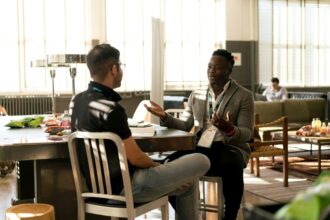LEON USIGBE takes a look at the efforts to alleviate poverty and improve the quality of life in Nigeria through the Sustainable Development Goals (SDGs).
There are 17 Sustainable Development Goals (SDGs) and Targets that countries of the world should satisfy by the year 2030. Some of them include ending poverty, hunger, improving health, ensuring quality education, gender equality, water and sanitation, energy for all, and sustainable economic growth. In Nigeria, the onus of coordinating the attainment of the goals rests with the Senior Special Assistant (SSA) to the President on SDGs, Mrs. Adejoke Orelope-Adefulire, who recently, provided an update on the country’s efforts to ensure that the stated goals are met at the appointed time.
The year 2023 is eight years away but the SDGs is already celebrating successes in four key areas. These are the establishment of multi-layer and multi-cluster institutional frameworks for enhanced coordination and SDGs mainstreaming process, existence of good policy planning framework, upscaling the Conditional Grants Scheme and identifying and targeting the poor and vulnerable groups in the country.
Poverty is a daunting problem in Nigeria. Some statistics put the percentage of people living below poverty level in the country at 70, dropping to the poverty capital of the world. The SDGs has however deployed its resources as part of the overall effort to change this depressing narrative.
Thus, towards alleviating poverty, 23 states and the Federal Capital Territory (FCT) have so far received N24,450,000,000.00 from the Conditional Grant Schemes as incentive to invest more of their resources into areas of national development priorities coming under the Millenium Development Goals (MDGs) and the SDGs. The fund, disbursed from 2015 till date, was introduced in 2007 with a 50 percent marching grant from the federal government and 50 percent from the participating states.
According Mrs. Orelope-Adefulire, the grants were targeted at education, health, water and sanitation projects «and aimed at executing pro-poor projects in a consultative manner with the beneficiaries.»
Specifically, she revealed that the money was spent on the implementation of 732 water and sanitation facilities; 494 health facilities (new facilities and renovation/rehabilitation); 616 education facilities (new construction, renovation/rehabilitation of block of classrooms; 1,150 women and men were empowered/trained in vocational skills, such as sewing, knitting, detergent & pomade making etc.). She also said that there are special intervention projects across the geo-political zones, an initiative, she affirmed, aimed at strategic investment to fast-track the achievement of the SDGs goals in Nigeria.
The presidential aide stated: «Between 2016 and 2021, a record number of projects have been implemented, aimed at providing essential services to accelerate the achievement of the SDGs, by ensuring no Nigerian is left behind. In the education sector, 8,008 classrooms constructed and 305 renovated with furnishing to strengthen basic education across the country. A total of 4,845 Desktop and Laptop Computers have also been supplied to schools across the country for Information and Communication Technology (ICT) training.
«In the health sector, 195 Health Centres, comprising Primary Healthcare Centres (PHC) and Mother and Child Centres (MCC) were constructed, complemented with the supply of 199 Intensive Care and Rural ambulances. About 257 incubators and 7,464 regular and automated hospital beds were supplied across tour health facilities.
«In other cross-cutting sectors, (Office of the Senior Special Assistant to the President) OSSAP-SDGs constructed 66 Vocational and Skills Acquisition Centres; supplied 1,294 transformers; provision of 19,266 solar-powered streetlights; 300 Housing units for internally displaced persons (IDP) in Borno State; and 925 Solar Boreholes, in addition to several other interventions.»
Findings in the Nigeria’s 2nd Voluntary National Review (VNR) 2020 on SDG-3, indicate that while the country faces challenges on health outcomes, such as high rates of maternal mortality, there have been significant reduction in the under-five mortality rates (from 157 to 132) just as Nigeria’s current access to basic drinking water now stands at 64%. Government hopes to end poverty and share prosperity under SDGs Goal 1 by maintaining steady investment in expenditure in health, education, and other social services. Orelope-Adefulire assured that work is continuing on achieving Zero Hunger, and healthy lives and well-being for all ages.
One of the positive signs of progress is the participation rate of youth and adults in formal and non-formal education, which increased from 4.97 percent in 2016 to 5.38 in both 2017 and 2018. «The Nigerian government has demonstrated strong commitment towards the 2030 Agenda for sustainable development and the SDGs. Institutional Frameworks have been established at the national and sub-national levels to support effective implementation of the SDGs. Thus, Nigeria is leading in the institutionalization of the SDGs,” Orelope-Adefulire further assured.
Despite the confidence expressed, attaining the goals of the SDGs is constrained by several challenges including over-reliance on the oil and gas sector; dwindling agricultural production, and productivity as well as limited value addition in the agricultural sector. In order to grow the economy, create jobs, address poverty and ensure food security, much more than oil and gas is evidently required. Another challenge is infrastructure deficit and technology gaps, which hinder service provision and application of science, technology and innovations in many spheres of life.
Also bothersome to the SDGs is economic recession and humanitarian crisis in the country due to fluctuating oil price in the international market. The humanitarian crisis in the North East similarly presents unique challenges that are detrimental to the achievement of the SDGs.
Therefore, the SDGs is hoping that support will come in mobilizing adequate financial and other resources; including from domestic sources and through the traditional partnerships. The SDGs is hopeful of improved performance with advances on the efforts to combat illicit financial flows as well as strengthening asset recovery measures and the enforcement of whistle-blower policy as part of national fight against corruption. Fiscal reform initiatives undertaken are also expected to contribute to domestic resource mobilization for implementation of the SDGs.
It will also require support in the area of Technology Transfer and Capacity Building in, among others, data, information and performance management, needed to support both the SDGs implementation agenda and ensuring accountability.
ALSO READ FROM NIGERIAN TRIBUNE
- ASUU Extends Strike By 4 Weeks
- Forex Crisis: Fresh Facts Reveal NNPC’s $2.7bn Remittance To Its CBN Accounts In 6 Months









